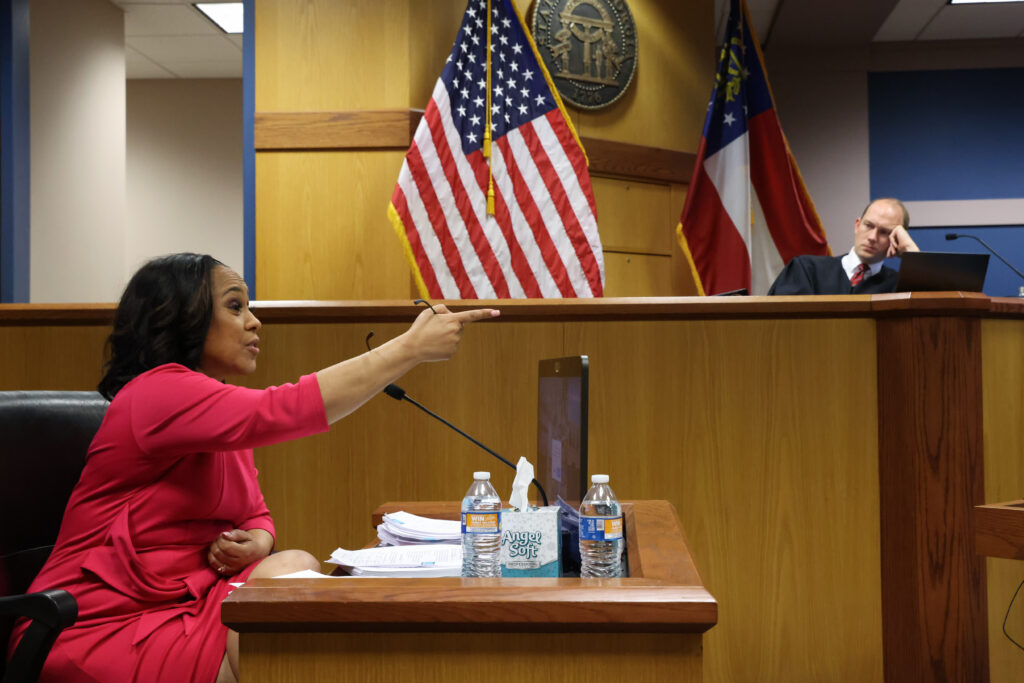
Fulton County District Attorney Fani Willis speaks from the witness stand in front of Fulton County Superior Judge Scott McAfee during a hearing in 2024. McAfee later ruled that the codefendants in the election interference case did not prove a conflict of interest, but he concluded there was a “significant appearance of impropriety.” The Georgia Court of Appeals disagreed and removed Willis from the case. Alyssa Pointer-Pool/Getty Images
She blew it.
Fani Willis blew it.
Give her credit for this much: The Fulton County district attorney did have the guts, the courage and the ambition to attempt to bring Donald Trump to justice for his role in trying to overthrow the 2020 election here in Georgia. For all we know, Willis might also have had the evidence needed to convict him and his co-defendants, both in the eyes of a jury and in the eyes of the nation.
But she never got the chance to present her case.
Why?
Because she blew it. Yes, she made a series of questionable calls, but she blew it by starting up a romantic relationship with the special prosecutor she hired to help her prosecute the case against Trump, and compounded it by stubbornly mishandling the subsequent scandal. In December, the Georgia Court of Appeals disqualified Willis as prosecutor in the case, ruling that the appearance of impropriety made it impossible for her to continue. Earlier this month, the Georgia Supreme Court rejected her appeal, ending Willis’ involvement and all but ending the case as well.
In fairness, those rulings come off less like reasoned legal opinions and more like attempts to make a controversial, politically awkward case go away. If so, it’s not an unreasonable tack to take.
But again, Willis has only herself to blame for being in that position in the first place. A local district attorney who is attempting to prosecute a former (and future) president on politically charged crimes had better do everything by the book, showing good judgment throughout, to have a decent chance at success. Even defenders of Willis have a hard time making the case that she met that standard.
When she filed the case against Trump and 18 other alleged co-conspirators, Willis did so under the state RICO, or racketeering conspiracy case. That decision guaranteed that what followed would be a complicated, far-flung case in which a lot could go wrong, especially against top-flight defense counsel attracted by a rich defendant and a crime-of-the-century case.
Indeed, in an unrelated RICO case involving the Atlanta rapper Young Thug and 27 co-defendants, Willis and her office did nothing to build confidence that they were capable of succeeding under such conditions. The Young Thug trial devolved into a carnival, the longest running trial in state history, and in the end most defendants went free after getting credit for time served.
Last November, Willis won re-election, in part because the Trump and Young Thug cases fell apart too late in the political calendar for major challengers to put a campaign together. She now has three-plus years to try to redeem her reputation and to hope that memories fade.
It’s also important to note that Willis launched her grand-jury investigation into Trump’s attempt to steal the election in February 2021, at a time when federal authorities were showing little stomach for doing so. It should not have been left to a local prosecutor to handle a case of such magnitude and consequence.
If she blew it, then Attorney General Merrick Garland and the federal Department of Justice blew it even worse.
YOU MAKE OUR WORK POSSIBLE.


![[Aggregator] Downloaded image for imported item #1146346](https://whitecounty.com/wp-content/uploads/2025/09/GettyImages-2006233849-1024x683-1-696x464.jpg)


